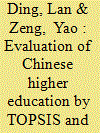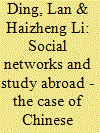| Srl | Item |
| 1 |
ID:
143379


|
|
|
|
|
| Summary/Abstract |
This study uses techniques for order preference by similarity to ideal solution (TOPSIS) combined with information entropy weight (IEW), to investigate the performance of 68 Chinese universities belonging to the Ministry of Education (MOE) from 2002 to 2011. Assessments in teaching & research, and development ability reflect the short-term and long-term performance respectively. Development ability, consisting of human & physical capital, is an essential determinant, which is hardly found in the former evaluation. The performance of universities suggests that current fiscal expenditure allocation mechanism on Chinese universities is unreasonable, and Chinese higher education as a whole is inefficient. Furthermore, the performance of universities within the eastern region is better than the universities within the central and western regions, and that of the comprehensive universities is better than most specialist universities. Research and development ability largely determine the overall performance of universities. And the superiority and inferiority still co-exist in Chinese universities.
|
|
|
|
|
|
|
|
|
|
|
|
|
|
|
|
| 2 |
ID:
128154


|
|
|
|
|
| Publication |
2012.
|
| Summary/Abstract |
Using a unique data set on Chinese visiting students in the US, we investigate some non-traditional determinants, especially social networks/connections, on the number of Chinese students hosted in American universities. Applying truncated, OLS, and GLS estimation, we find that social networks/connections have a strong positive and significant effect, and the result is robust across model specifications and estimation methods.
|
|
|
|
|
|
|
|
|
|
|
|
|
|
|
|